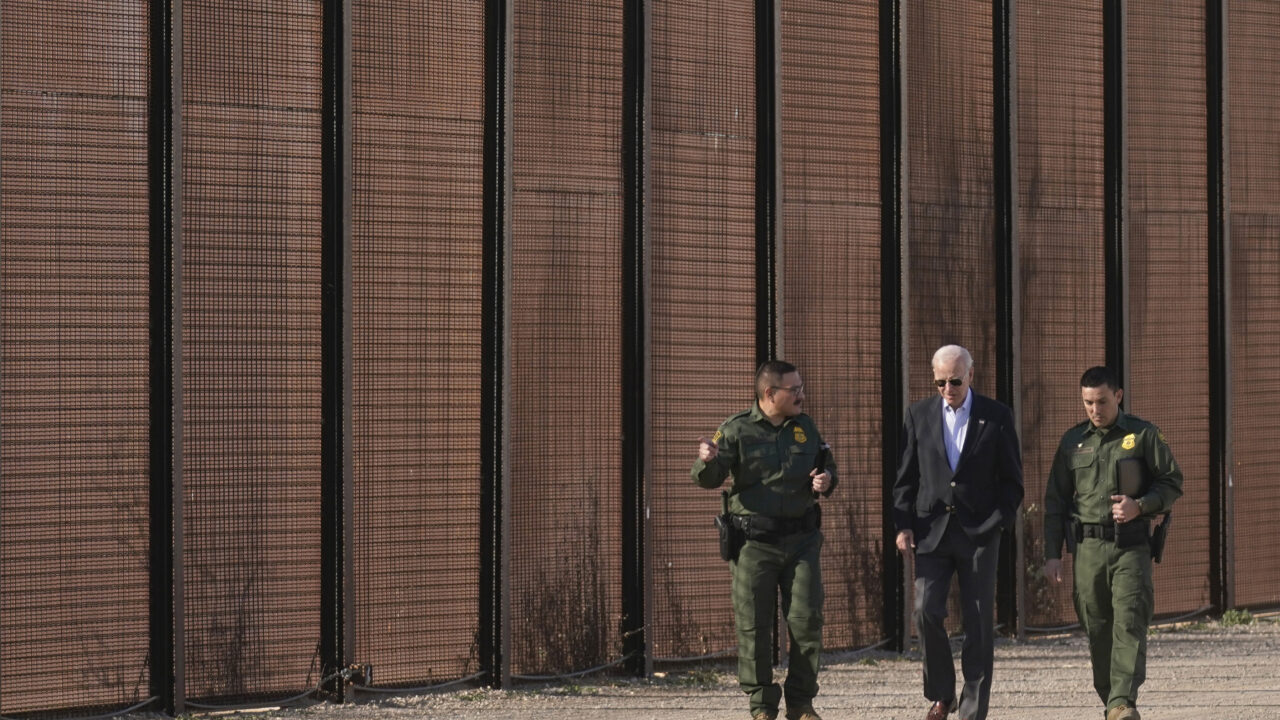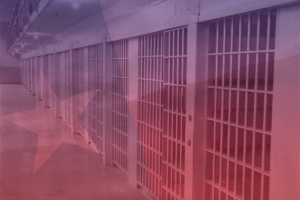Why Biden’s Transit Ban Is Inhumane
The proposed asylum rule violates the law, endangers the vulnerable, and undermines U.S. interests. President Biden walks along a stretch of the U.S.-Mexico border in El Paso Texas, Jan. 8, 2023. (AP Photo/Andrew Harnik, File)
President Biden walks along a stretch of the U.S.-Mexico border in El Paso Texas, Jan. 8, 2023. (AP Photo/Andrew Harnik, File)
On February 21, the Departments of Homeland Security and Justice introduced a draft rule (“Notice of Proposed Rulemaking”) that would deny the legal right to seek asylum to many migrants who passed through other countries on their way to the U.S.-Mexico border and did not first seek asylum in those countries.
The rule would partially shut down, to a historic and legally questionable extent, the right to seek asylum upon reaching U.S. soil, a legal right that was laid out in Section 208 of the Immigration and Nationality Act and in the 1951 Refugee Convention.
This “transit ban” is part of an edifice of asylum limitations and alternative pathways that the Biden administration is building ahead of the Title 42 authority’s possible end on May 11, 2023, when the U.S. government’s COVID-19 public health emergency is to end. A February 17 WOLA commentary explained these new components.
Members of the public have until March 27 to submit comments, to which the administration must respond before implementing it. (WOLA encourages you, the reader, to submit your own comment.)
The asylum ban, paired with the expedited removal process, will fuel mass deportations of people who could otherwise qualify for asylum.
The Washington Office on Latin America’s comment, submitted on March 22, is reproduced below. It makes the following arguments.
- The proposed rule’s denial of access to asylum would violate U.S. asylum law. The law foresees only two scenarios in which an asylum seeker could be returned to another country (beyond the Title 42 authority, whose legality remains before the courts). These two scenarios rarely apply. The administration’s claims that the law gives it flexibility to add new conditions on asylum are refuted by the wording of the statute, and the reality that even the Trump administration was unable to add conditions.
- The asylum ban, paired with the expedited removal process, will fuel mass deportations of people who could otherwise qualify for asylum. This dramatically increases the likelihood of “refoulement,” or knowingly returning a threatened person to likely danger. Refoulement is a serious human rights violation.
- CBP One and Humanitarian Parole, the rule’s proposed alternative pathways, are insufficient to protect at-risk populations. Both pathways, in their current form, have severe flaws that deny access to protection to large numbers of people who might need it.
- The transit ban would expel people to danger in northern Mexico. If Mexico agrees, once again, to accept large numbers of migrants from third countries, then thousands of people will once again be left homeless in Mexican border cities, some of the most dangerous communities in the country. Recent years’ experience in these cities has shown that migrants are highly vulnerable to predation from organized crime.
WOLA’s comment on the draft asylum rule calls on the Departments of Homeland Security and Justice “to withdraw this rule in its entirety, to avoid endangering and immiserating migrants arriving at the U.S. southern border, and instead allocate resources toward vastly increased capacity for humane asylum processing, alternatives to detention, and fair adjudications.”
That asylum—which requires migrants to reach U.S. soil—is not the best path to protection does not mean that a rule is needed to curtail it.
It is absurd to require hundreds of thousands of migrants who need protection, or who could be contributing to U.S. communities and economies, to first cross the Darién Gap, Central America, and Mexico, in order to somehow set foot on U.S. soil and still face considerable probability of denial and continued danger. There must be safer and more accessible pathways, for those who need it, to seek protection.
That asylum—which requires migrants to reach U.S. soil—is not the best path to protection does not mean that a rule is needed to curtail it. Often, people fleeing danger have no other choice but to seek asylum, especially now, when so many other paths to protection are closed off. The right to apply for asylum, without regard to how one arrives on U.S. soil or what route one takes to do so, is firmly established in U.S. law and in the United States’ international humanitarian obligations. That must not change.
The Washington Office on Latin America calls on the Departments of Homeland Security and Justice to withdraw this rule in its entirety, to avoid endangering and immiserating migrants arriving at the U.S. southern border, and instead allocate resources toward vastly increased capacity for humane asylum processing, alternatives to detention, and fair adjudications.
Read the full comment here.
Your support matters…Independent journalism is under threat and overshadowed by heavily funded mainstream media.
You can help level the playing field. Become a member.
Your tax-deductible contribution keeps us digging beneath the headlines to give you thought-provoking, investigative reporting and analysis that unearths what's really happening- without compromise.
Give today to support our courageous, independent journalists.






You need to be a supporter to comment.
There are currently no responses to this article.
Be the first to respond.